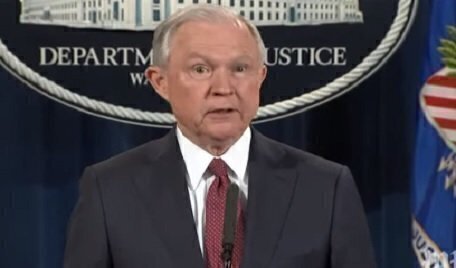Attorney General Jeff Sessions announced on Tuesday that the Trump administration will end the Deferred Action for Childhood Arrivals (or DACA) program in early March 2018, leaving its ultimate fate to Congress or the court system.
 Attorneys General from nine states, led by Texas, had notified the Justice Department amend a lawsuit currently in the Southern District of Texas to include the DACA program, if executive action wasn’t taken by September 5, 2017 to phase it out.
Attorneys General from nine states, led by Texas, had notified the Justice Department amend a lawsuit currently in the Southern District of Texas to include the DACA program, if executive action wasn’t taken by September 5, 2017 to phase it out.
Under the actions taken today, the Department of Homeland Security will rescind the June 2012 executive order that established the DACA program and not accept new program applicants. It will allow a six-month delay in any actions against program participants.
Sessions said the action was made to counter what he felt were unconstitutional actions by the Obama administration to enact a program that was best left to Congress.
“The Executive Branch through DACA deliberately saw to achieve what the legislative branch specifically refused to authorize on multiple occasions. Such an open-ended circumvention of immigration laws was an unconstitutional exercise of authority by the executive branch,” Sessions said.
He also believed the 2012 DACA program that couldn’t be defended in court. “If we were to keep the Obama administration's executive amnesty policy the likeliest outcome is that it would, too, be enjoined,” Sessions said.
The Department of Homeland Security will oversee a wind-down period for the program, Sessions said.
In 2012, the Department of Homeland Security issued DACA deportation guidelines that eventually allowed about 800,000 people who were brought to the United States as young undocumented immigrants to stay here on a temporary basis. That group included undocumented people under the age of 31 who had been in the United States continuously since June 15, 2007; were under the age of 16 years old when they arrived; were in or had graduated from school or were honorably discharged veterans; and hadn’t broken the law in a significant way.
A federal judge in Texas had issued a national injunction to block the policies that extended deferred immigration protections to parents and people entering the United States between mid-2007 and 2010; a federal appeals and the Supreme Court upheld the injunction. Texas Attorney General Ken Paxton had threated to amend that lawsuit to include the 2012 DACA program.
“Courts blocked DAPA and Expanded DACA from going into effect, holding that the Executive Branch does not have the unilateral power to confer lawful presence and work authorization on unlawfully present aliens simply because the Executive chooses not to remove them,” Paxton argued back in June.
Paxton also said in June that the group would win in court based on their prior success in blocking the other two Obama proposals. “For these same reasons that DAPA and Expanded DACA’s unilateral Executive Branch conferral of eligibility for lawful presence and work authorization was unlawful, the original June 15, 2012 DACA memorandum is also unlawful,” Paxton said.
The American Civil Liberties Union and the attorneys general of New York and Washington states have vowed to pursue the issue in court.
“Attorney General Jeff Sessions is dead wrong to say DACA is unconstitutional,” the national office of the ACLU said on Twitter during Sessions’ announcement.
"If [President Trump] moves forward with this cruel action, New York State will sue to protect the 'dreamers' and the state's sovereign interest in the fair and equal application of the law," New York Governor Andrew Cuomo said on Sunday. "Ending this policy represents an assault on the values that built this state and this nation.”
Scott Bomboy is editor in chief of the National Constitution Center.






